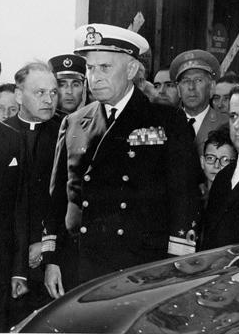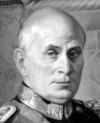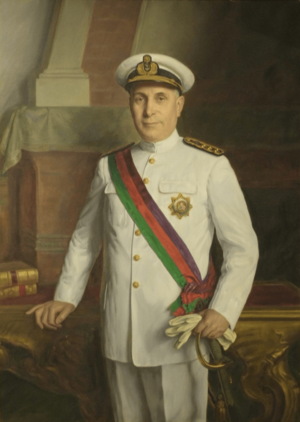Américo Tomás facts for kids
Quick facts for kids
Américo Tomás
|
|
|---|---|

Tomás in 1963
|
|
| President of Portugal | |
| In office 9 August 1958 – 25 April 1974 |
|
| Prime Minister | António de Oliveira Salazar Marcello Caetano |
| Preceded by | Francisco Craveiro Lopes |
| Succeeded by | António de Spínola |
| Minister of the Navy | |
| In office 6 September 1944 – 10 May 1958 |
|
| Prime Minister | António de Oliveira Salazar |
| Preceded by | Manuel Ortins de Bettencourt |
| Succeeded by | Fernando de Quintanilha e Mendonça Dias |
| Interim Minister of Defence | |
| In office 22 May 1957 – 29 June 1957 |
|
| Prime Minister | António de Oliveira Salazar |
| Preceded by | Fernando dos Santos Costa |
| Succeeded by | Fernando dos Santos Costa |
| Interim Minister of the Colonies | |
| In office 9 June 1945 – 14 November 1945 |
|
| Prime Minister | António de Oliveira Salazar |
| Preceded by | Marcello Caetano |
| Succeeded by | Marcello Caetano |
| Personal details | |
| Born |
Américo de Deus Rodrigues Tomás
19 November 1894 Lisbon, Kingdom of Portugal |
| Died | 18 September 1987 (aged 92) Cascais, Portugal |
| Political party | National Union |
| Spouse | Gertrudes Ribeiro da Costa |
| Children | Maria Natália (died in 1980) Maria Madalena |
| Alma mater | Portuguese Naval School |
| Profession | Naval officer |
| Awards | Order of Christ Order of Aviz Order of St. James of the Sword Order of Charles III |
| Signature | |
| Military service | |
| Allegiance | |
| Branch/service | |
| Years of service | 1914–1974 |
| Rank | Rear admiral |
| Battles/wars | First World War Portuguese Colonial War |
Américo de Deus Rodrigues Tomás (born 19 November 1894 – died 18 September 1987) was a Portuguese Navy officer and a politician. He served as the 13th President of Portugal from 1958 to 1974.
Contents
About Américo Tomás
His Early Life
Américo de Deus Rodrigues Tomás was born in Lisbon, Portugal. His parents were António Rodrigues Tomás and Maria da Assunção Marques. In October 1922, he married Gertrudes Ribeiro da Costa. They had two daughters: Maria Natália Rodrigues Tomás (born 1925) and Maria Madalena Rodrigues Tomás (born 1930).
Américo Tomás started high school in Lapa, Portugal, in 1904. He finished his high school education in 1911. After that, he studied at the Faculty of Sciences for two years, from 1912 to 1914. Then, he joined the Naval Academy to become a naval officer.
Américo Tomás graduated from the Naval Academy in 1916. He was first assigned to the Portuguese coast escort service. He served on ships like the Vasco da Gama, Pedro Nunes, and the destroyers Douro and Tejo during World War I. In 1918, he was promoted to Lieutenant.
In 1920, he joined the survey vessel 5 de Outubro. He worked there for 16 years. During this time, he helped map the Portuguese coast. He was also part of groups that studied Hydrography (mapping water), Navigation, and Meteorology (weather). He also helped with studies about Oceanography (the ocean) and Fisheries (fishing).
Tomás became the chief of staff for the Minister of the Navy in 1936. From 1940 to 1944, he led the National Junta for the Merchant Navy (ships that carry goods). Then, from 1944 to 1958, he himself became the Minister of the Navy.
As Minister of the Navy, he oversaw a big project to rebuild Portugal's commercial navy. Fifty-six new ships were ordered. This project also helped create the modern shipbuilding industry in Portugal. His work in the Navy earned him a good reputation.
Becoming President
In 1958, Américo Tomás was chosen to run for president. He was the candidate for the ruling National Union party. The Prime Minister at the time, António de Oliveira Salazar, picked him. Tomás ran against Humberto Delgado, who was supported by the opposition.
The election system was set up to favor the ruling party. Many people believed that Delgado would have won if the election had been fair. Salazar was worried by how close the election seemed. So, he changed the rules. After that, the president was chosen by the legislature (the law-making body), which the ruling party controlled. Tomás was re-elected by the legislature in 1965 as the only candidate.
For his first ten years as president, Tomás had little real power. The Prime Minister, Salazar, held most of the power. Salazar had chosen Tomás because the previous president had been too independent. Tomás mostly attended official events and ceremonies. Because he didn't have much power and wasn't a great speaker, he sometimes became the subject of jokes.
Tomás used his presidential power only once during his first decade. In September 1968, Salazar became very ill. Tomás removed Salazar from his position and appointed Marcelo Caetano as the new Prime Minister. Salazar reportedly never knew he had been removed. He believed he was still Prime Minister when he died two years later.
After Caetano became Prime Minister, Tomás became more involved in the government. He was not as willing to let Caetano have complete control as he had let Salazar. Tomás became a leader for those who did not want Caetano to make changes to the government. Caetano's attempts at reform were not enough for most people. However, Caetano struggled to get even small changes approved by Tomás and the hardliners. A year later, Tomás and others stopped these reform efforts.
Unlike the president before him, Tomás lived in his own home while he was president. He used the Belém Palace only as his office and for official events.
After the Presidency
On 25 April 1974, a peaceful revolution called the Carnation Revolution took place. This event ended 48 years of authoritarian rule in Portugal. After being removed from power, Tomás went to live in Brazil.
He was allowed to return to Portugal in 1980. However, he was not allowed to rejoin the Portuguese Navy. He also did not receive the special pension given to former presidents.
Américo Tomás passed away at the age of 92 in a clinic in Cascais. He died from problems after surgery.
Honours
Américo Tomás was featured on the Angolan escudo banknotes in 1962 and 1970.
Images for kids
See also
 In Spanish: Américo Tomás para niños
In Spanish: Américo Tomás para niños
 | Mary Eliza Mahoney |
 | Susie King Taylor |
 | Ida Gray |
 | Eliza Ann Grier |





